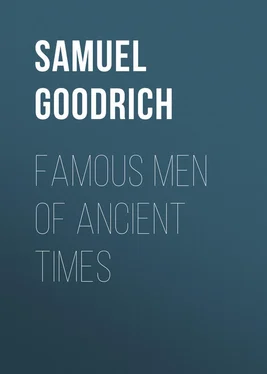Samuel Goodrich - Famous Men of Ancient Times
Здесь есть возможность читать онлайн «Samuel Goodrich - Famous Men of Ancient Times» — ознакомительный отрывок электронной книги совершенно бесплатно, а после прочтения отрывка купить полную версию. В некоторых случаях можно слушать аудио, скачать через торрент в формате fb2 и присутствует краткое содержание. Жанр: foreign_prose, на английском языке. Описание произведения, (предисловие) а так же отзывы посетителей доступны на портале библиотеки ЛибКат.
- Название:Famous Men of Ancient Times
- Автор:
- Жанр:
- Год:неизвестен
- ISBN:нет данных
- Рейтинг книги:5 / 5. Голосов: 1
-
Избранное:Добавить в избранное
- Отзывы:
-
Ваша оценка:
- 100
- 1
- 2
- 3
- 4
- 5
Famous Men of Ancient Times: краткое содержание, описание и аннотация
Предлагаем к чтению аннотацию, описание, краткое содержание или предисловие (зависит от того, что написал сам автор книги «Famous Men of Ancient Times»). Если вы не нашли необходимую информацию о книге — напишите в комментариях, мы постараемся отыскать её.
Famous Men of Ancient Times — читать онлайн ознакомительный отрывок
Ниже представлен текст книги, разбитый по страницам. Система сохранения места последней прочитанной страницы, позволяет с удобством читать онлайн бесплатно книгу «Famous Men of Ancient Times», без необходимости каждый раз заново искать на чём Вы остановились. Поставьте закладку, и сможете в любой момент перейти на страницу, на которой закончили чтение.
Интервал:
Закладка:
Anxious to know the event of the coming battle, Attila consulted the sorcerers, who foretold his defeat. Though greatly alarmed, he concealed his feelings, and rode among his warriors, animating them for the impending struggle. Inflamed by his ardor, the Huns were eager for the contest. Both armies fought bravely. At length the ranks of the Romans and Gauls were broken, and Attila felt assured of victory, when, suddenly, Thorismond, son of Theodoric, swept down like an avalanche from the neighboring heights upon the Huns. He threw them into disorder, spread death through their ranks, and Attila, pressed on all sides, escaped to his camp with the utmost difficulty.
This was the bloodiest battle ever fought in Europe, for 106,000 men lay dead on the field. Theodoric was slain, and Attila, who had gathered his treasures into a heap, in order to burn himself with them in case he was reduced to extremities, was left unexpectedly to make his retreat.
Having returned to Hungary and reinforced his army, he proceeded to repeat his demand for the hand of Honoria. He mastered the unguarded passes of the Alps, and, in 452, carried devastation into the north of Italy. At last he approached the city of Rome, when a supplicatory embassy met him, Pope Leo I. being at its head. The eloquence of the pontiff, united to prudential considerations, prevailed, and the city was saved; Attila returning to his home beyond the Danube. The Romans looked upon this preservation as a miracle, and they have preserved a legend that St. Peter and St. Paul appeared to the barbarian, and threatened him with instant death, if he did not accept the proffered terms.
Attila now soothed himself by adding the beautiful Ildico to his numerous wives, whom he wedded with all due ceremony. On this occasion he gave himself up to licentiousness, but in the morning after his marriage, he was found dead in his tent, and covered with blood, Ildico sitting veiled by his side. The story went abroad that he had burst a blood-vessel, and died in consequence, but a common suspicion is entertained that he was stabbed by his bride.
The news of Attila's death spread terror and sorrow among his army. His body was enclosed in three coffins, – the first of gold, the second of silver, and the third of iron. The captives who dug his grave were strangled, so that the place of his burial might not be known.
In person, Attila was marked with the Tartar characteristics, from which he, as well as the people of his kingdom, were descended. He was low in stature, broad-chested, and of a powerful frame. He was dark complexioned, with a few straggling hairs for beard, a flat nose, large head, and small eyes. No one could look upon him, and not feel that he had come into the world to disturb it. The number of persons slain in his battles amounted to hundreds of thousands, yet to so little purpose, that his empire was immediately dismembered upon his death.
NERO
Claudius Cæsar Nero was son of Caius Domitius Ænobarbus and Agrippina, the daughter of Germanicus and wife of the Emperor Claudius, after the death of her first husband. He was adopted by the Emperor Claudius, A.D. 50, and when he was murdered by his wife, four years after, Nero succeeded him on the throne. He possessed excellent talents, and was carefully educated by Seneca and Burrhus. The beginning of his reign was marked by acts of the greatest kindness and condescension, by affability, complaisance and popularity. The object of his administration seemed to be the good of his people; and when he was desired to sign his name for the execution of a malefactor, he exclaimed, "I wish to heaven I could not write!" He appeared to be an enemy to flattery, and when the senate had liberally commended the wisdom of his government, Nero desired them to keep their praises till he deserved them.
But these promising virtues were soon discovered to be artificial, and Nero displayed the real propensities of his nature. He delivered himself from the sway of his mother, and at last ordered her to be assassinated. This unnatural act of barbarity shocked some of the Romans; but Nero had his devoted adherents; and when he declared that he had taken away his mother's life to save himself from ruin, the senate applauded his measures, and the people signified their approbation. Even Burrhus and Seneca, Nero's advisers, either counselled or justified his conduct. Many of his courtiers shared the unhappy fate of Agrippina, and Nero sacrificed to his fury or caprice all such as obstructed his pleasures, or stood in the way of his inclinations.
In the night he generally sallied out from his palace, to visit the meanest taverns and the scenes of debauchery in which Rome abounded. In his nocturnal riots he was fond of insulting the people in the streets, and on one occasion, an attempt to offer violence to the wife of a Roman senator nearly cost him his life. He also turned actor, and publicly appeared on the Roman stage, in the meanest characters. He had an absurd passion to excel in music, and to conquer the disadvantages of a hoarse, rough voice, he moderated his meals, and often passed the day without eating.
The celebrity of the Olympic games having attracted his notice, he passed into Greece, and presented himself as a candidate for the public honors. He was defeated in wrestling, but the flattery of the spectators adjudged him the victory, and Nero returned to Rome with all the pomp and splendor of an eastern conqueror, drawn in the chariot of Augustus, and attended by a band of musicians, actors, and stage dancers from every part of the empire.
These private and public amusements of the emperor were comparatively innocent; his character was injured, but not the lives of the people. His conduct, however, soon became more censurable; he was guilty of various acts which cannot be even named with decency. The cruelty of his nature was displayed in the sacrifice of his wives Octavia and Poppæa; and the celebrated writers, Seneca, Lucan, Petronius, &c., became the victims of his wantonness. The Christians did not escape his barbarity. He had heard of the burning of Troy, and as he wished to renew that dismal scene, he caused Rome to be set on fire in different places. The conflagration became soon universal, and during nine successive days the fire was unextinguished. All was desolation; nothing was heard but the lamentations of mothers whose children had perished in the flames, the groans of the dying, and the continual fall of palaces and buildings.
Nero was the only one who enjoyed the general consternation. He placed himself on a high tower and he sang on his lyre the destruction of Troy; a dreadful scene which his barbarity had realized before his eyes. He attempted to avert the public odium from his head, by a feigned commiseration of the sufferings of his subjects, and by charging the fire upon the Christians. He caused great numbers of them to be seized and put to death. Some were covered with the skins of wild beasts, and killed by dogs set upon them; others were crucified; others were smeared with pitch and burned, at night, in the imperial gardens, for the amusement of the people!
Nero began to repair the streets and the public buildings at his own expense. He built himself a celebrated palace, which he called his golden house. It was profusely adorned with gold and precious stones, and with whatever was rare and exquisite. It contained spacious fields, artificial lakes, woods, gardens, orchards, and every device that could exhibit beauty and grandeur. The entrance to this edifice would admit a colossal image of the emperor, one hundred and twenty feet high; the galleries were each a mile long, and the whole was covered with gold. The roofs of the dining halls represented the firmament, in motion as well as in figure, and continually turned round, night and day, showering all sorts of perfumes and sweet waters. When this grand edifice, which, according to Pliny, extended all round the city, was finished, Nero said that he could now lodge like a man!
Читать дальшеИнтервал:
Закладка:
Похожие книги на «Famous Men of Ancient Times»
Представляем Вашему вниманию похожие книги на «Famous Men of Ancient Times» списком для выбора. Мы отобрали схожую по названию и смыслу литературу в надежде предоставить читателям больше вариантов отыскать новые, интересные, ещё непрочитанные произведения.
Обсуждение, отзывы о книге «Famous Men of Ancient Times» и просто собственные мнения читателей. Оставьте ваши комментарии, напишите, что Вы думаете о произведении, его смысле или главных героях. Укажите что конкретно понравилось, а что нет, и почему Вы так считаете.












